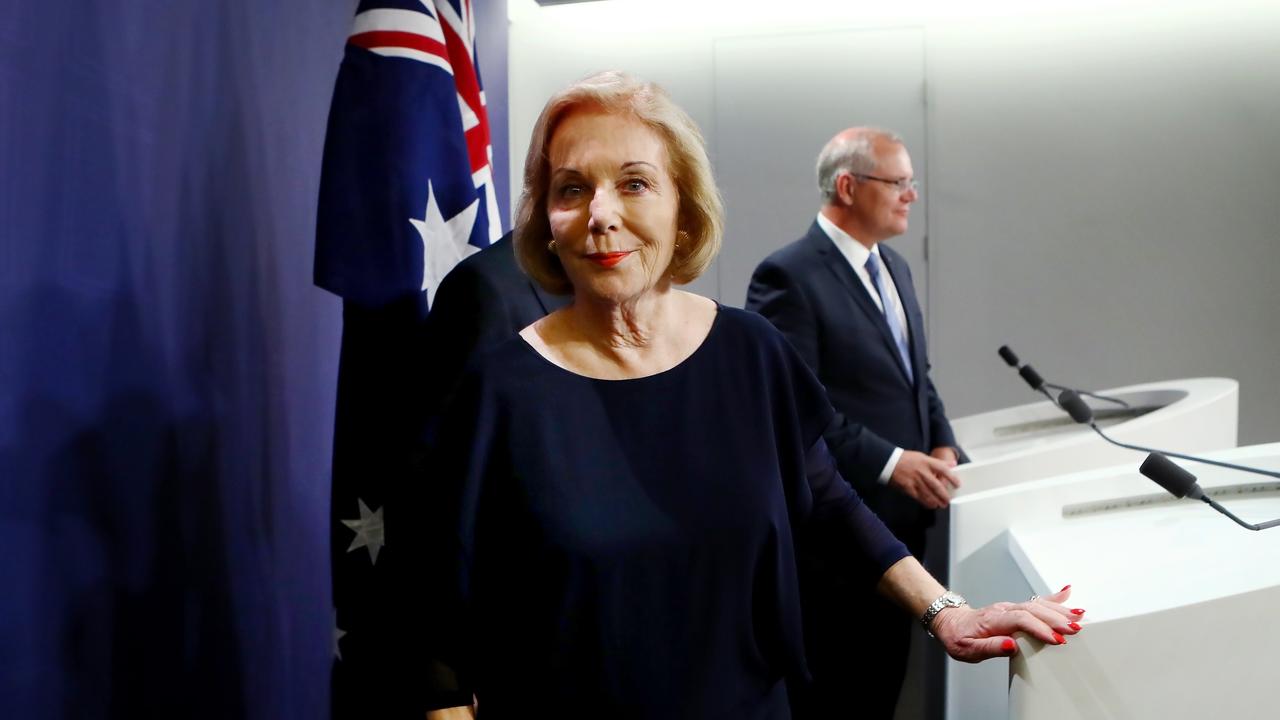
Ridiculous. It’s the only word for the situation in which we find ourselves following the provocative speech by Lionel Shriver at the Brisbane Writers Festival.
How ridiculous that we are debating in an even remotely serious way whether white writers can include black characters in their books. That sensible people would ever countenance the idea that the great American novelist Harper Lee should, for example, refrain from writing To Kill a Mockingbird — it’s about a black man facing trial for the rape of a white woman in the age of southern lynchings — until all the black writers have had their go.
How self-important has the Left become? Does it really now seek to censor literature?
For those who missed the original brouhaha, American writer Shriver — actually, we should probably say the straight, white, female American writer, since it’s apparently important that we know all this before we read her books — was invited to give the opening address at the Brisbane Writers Festival.
Shriver is the author of the peerless teen psycho novel, We Need To Talk About Kevin (which she managed to pull together despite the fact she’s not a mother, let alone of a psychotic killer, but perhaps there’s still time to have it pulped). She also has a reputation for being a mischief-maker, though the way people carried on while she was speaking, you’d be forgiven for thinking she’s a devil. What did she do? She offended some people. She hurt them with her words. We shouldn’t be surprised, I suppose, in this age in which it takes so little, but what happened next was chilling.
Shriver had been scheduled to talk about “community and belonging” but, as she said in her introduction, that was never going to work for her. She wanted to talk about the forces of political correctness that are trying to dictate not only what you think but what you can say, and especially what you write.
She started with an incident from a US college where kids organised a Mexican theme party. They handed out little sombreros and served tequila. Photographs went up on social media. Outrage ensued. A sanctions committee was formed. Kids got impeached. Those who felt “harmed” by the “cultural appropriation” were provided with counselling. At this point in her speech, Shriver put on a sombrero.
She gave a few more examples: pop star Katy Perry being criticised at the American Music Awards in 2013 for dressing like a geisha; a college that banned the serving of sushi rolls in plastic clamshells because that’s the cultural preserve of the Japanese.
What was the world coming to, she wondered, when “we have people questioning whether it’s appropriate for white people to eat pad thai”?
Shriver then spoke of writers who had been criticised — and badly reviewed — for daring to write from the perspective of a black person when they were not themselves black. Surely the point of fiction is the ability to get into somebody else’s shoes and have a good old walk around?
In her current book, Shriver has a rich, white character who dumps his longstanding wife for a younger woman. The adult kids are appalled — except when they find out the new wife is black, at which point they fall over themselves to make her feel welcome in their privileged home.
Shriver noted the paralysing fear of being called a racist, yet she kept going, developing her black character, because should this trend continue “all that’s left is memoir”.
Oh, the upset! People got up and walked out, notably Yassmin Abdel-Magied, an Australian of Egyptian and Sudanese descent, who later explained why in an essay for Medium: “We were 20 minutes into the speech when I turned to my mother, sitting next to me in the front row,” she wrote.
“ ‘Mama, I can’t sit here,’ I said, the corners of my mouth dragging downwards. ‘I cannot legitimise this …’ My mother’s eyes bore into me, urging me to remain calm, to follow social convention. I shook my head, as if to shake off my lingering doubts.
“As I stood up, my heart began to race. I could feel the eyes of the hundreds of audience members on my back … My mind was blank save for one question: ‘How is this happening?’ ”
Reading this, I couldn’t help thinking: How is what happening? How was it that Shriver was being allowed to speak? Was Abdel-Magied suggesting she be silenced? Booed and hissed until she could not continue?
Then came the chilling aftermath. The festival organisers — director Julie Beveridge and her team — were shaken to the core, not by Shriver’s speech but by the idea that people were offended. There were meetings behind closed doors and in the writers’ green room where I sat watching as they grappled with what to do.
No question, they were under tremendous pressure. They moved swiftly to organise a “right of reply” for Abdel-Magied. This was necessary, they said, because Shiver “did not speak to her brief”. This was not, she said, “the conversation we intended to have”.
Does anyone else feel the chill?
Yes, it has come to this. Censorship at a literary festival. Thought control at a celebration of letters in a Western democracy.
There was more. In her essay, Abdel-Magied said: “It’s not always OK if a white guy writes the story of a Nigerian woman because the actual Nigerian woman can’t get published or reviewed to begin with … It’s not always OK if a straight white woman writes the story of a queer
indigenous man, because when was the last time you heard a queer indigenous man tell their own story?”
We are now in the realm of the absurd. It’s not always OK to write from a different perspective? When is it OK? Who should decide? Shall we have guidelines? How about a censorship board like in the good old days? Should all writers put down their pens until every Buddhist Mexican wheelchair-user has had their go? What if their books are crap? Do we have to review them and say they’re good because otherwise it’s not fair?
Shakespeare’s The Merchant of Venice portrays the Jews as heartless moneylenders. In early versions of the play, Shylock was commonly portrayed in hideous caricature. It’s easy enough to draw a line from there to the persecution of Jews in Europe.
My grandfather is Jewish. He lost his family in the Holocaust. Who seeks to ban The Merchant of Venice? Why not all of Shakespeare? Not me. Never, ever.
No one can tell anything about Shriver’s experience with loss and longing and sorrow and love by looking at her face. They can tell how well she succeeds in her mission to examine the human condition only by turning the raw and blood-soaked pages of her books, where the words burn long after the back cover is closed.
Plus, it’s fiction! Are we really at the point where we want to censor even the imagination of our writers? Do critics not understand that it’s a mere trip from here to book burning?
The freedom to write as one pleases is a cornerstone of liberty. Poets and librarians are imprisoned for the distribution of unapproved ideas in Cuba but not here. Change comes from our willingness to see the other point of view.
One of the volunteers at the festival told me she thought critics of Shriver’s speech were suffering a terrible kind of victimhood … but she would never dare say so.
“I’ll be crucified,” she said.
Well, OK, but I can’t be silent. It’s fiction. People can write whatever they want, from whatever perspective they want, forever and a day. If you’d rather read a book about a black woman by a black woman, buy one, starting with anything by Toni Morrison. If your own perspective is missing from the canon, get out there and write something at least as good and let nothing as ridiculous as self-pity stand in your mighty way.
Caroline Overington is an Australian novelist whose book I Came to Say Goodbye, which was shortlisted for the Australian Book Industry Association Book of the Year, is written from the perspective of a 60-year-old man.



